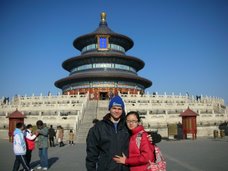John Derbyshire is one of my favorite writers. He is of a conservative temperament and always a thoughtful entertaining read - even when I don't agree with me. He is something of an authority on China, having married a Chinese Women and having studied its language and its literature.
Here is a passage, about China, from an interview done with him on the Internet:
BC: You are certainly a true Renaissance man. Others might not know of your expertise regarding China. Is China slowly but surely becoming a freer and better place in which to live? I was surprised to hear how many automobiles the Chinese are importing at present. Will the free market's success delegitimize the totalitarian structure of the government? Might we see a political implosion like with the Soviet Union?
JD: The only important question about China is what I call the "midwife" one. Can a secretive, authoritarian, corrupt, self-serving party with a disgraceful past serve as the midwife for a genuinely liberal-constitutional order? Most of my Chinese friends believe it can, and Fareed Zakaria, whose new book I have just been reading, agrees. "Sure," these optimists say, "the communists are awful. China is still a poor and backward country, though. It needs an authoritarian dictatorship to get it through the transition to a more modern kind of society, just as Taiwan and South Korea did. Once they are over that hump, democracy will emerge. Don't worry about the communists. In 10 or 15 years they'll be gone."
There is some merit in that argument. For example, one imperative for China right now is to dismantle the old "state-owned industries," the Soviet-style industrial behemoths producing goods nobody wants to buy. This would be impossible under an electoral democracy, at any rate without serious social disorder. There are just too many people dependent on those industries. A reform like that has to be pushed through by major force - though, as a matter of fact, the communists have not yet summoned up the guts to do it!
On the other hand, China is not Taiwan or South Korea. It is a much bigger country, with much greater disparities between large regions where things are pretty good, and large regions where things are terrible. It is also an empire, with Chinese troops and secret police garrisoning vast areas - half the territory of the "People's Republic"! - that are not really Chinese, and whose base populations simmer with religious and ethnic resentments, and with the memories of horrible atrocities against them and their ways of life in the recent past.
Worst and most dismaying of all, China is a country suffused with the most primitive, brutish and atavistic kind of chauvinism - a poisonous mix of resentment against past wrongs both real and imagined, an angry racism, and a belligerent assertion of China's right to do anything she damn well feels like doing, and can get away with.
Economics isn't everything. Mentality counts for something. The current national mentality of China - carefully cultivated by the Communists, of course, as a prop for their own legitimacy, but now out of their control like Frankenstein's monster - hovers on the edge of psychopathology, and seems to get worse with each rising generation. On some important issues, including relations with the U.S.A., the Chinese communist leadership is probably more liberal than the Chinese people, certainly than the young urban intellectuals I myself have had angry shouting matches with.
I got my education as a China-watcher from the old China hands of Hong Kong, who were uniformly pessimistic. Their entire outlook could be summed up as: "Never, never, never be optimistic about China. China will always break your heart." I had not fully internalized that outlook when 1989 came along, and I was optimistic that the student movement might effect real political change. It didn't, of course, and I resolved that I would never again be caught out being optimistic about China.
With that attitude, I have been resisting the "midwife" argument. I wouldn't rule it out, though, and it is a possible future for China. Yes, life in China is much freer and better now that 20, or even 10 years ago. Yes, China might follow the path of Taiwan, South Korea, Singapore. I would rate the probability at no better than 20 percent, though. Other, much uglier futures - some of them ugly only for the Chinese themselves, some ugly for the whole world - are, in my opinion, more probable. So count me a China pessimist.
A hundred years ago Sun Yat-sen, who understood his countrymen very well indeed, identified three areas in which the Chinese needed to change to a modern mentality: economics, politics, and the National Question. The first change has been pretty well accomplished, and the second could indeed follow, on the "midwife" principle. The third change, however, has not taken place. If anything, the Chinese have gone backward in the ability to see themselves as a nation in a world of nation-states. Far from having escaped from the imperial-civilizational mentality, they are sunk in it deeper than ever.
The contradictions inherent in the National Question could destroy all China's progress. They could, in fact, destroy the world. The really bad news is that there is probably nothing at all we can do about this, except to keep yelling in their ears. Events in China have never followed any foreigner's script, and when foreigners have tried to push China in any particular direction, China has generally veered off at right angles, like a gyroscope.








1 comment:
Well written article.
Post a Comment